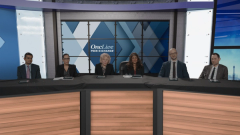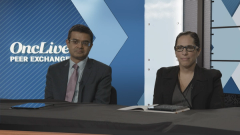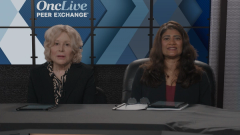
Non-Covalent BTK Inhibitors in CLL: Updates from Clinical Trials With Pirtobrutinib
Expert perspectives on the role of non-covalent BTK inhibitors in managing patients diagnosed with chronic lymphocytic leukemia.
Transcript:
Sonali M. Smith, MD: What we’ve talked about so far have been first- and second-generation BTK [Bruton tyrosine kinase] inhibitors. One thing they all share is that they’re covalent inhibitors of BTK. We have a new generation of BTK inhibitors that are noncovalent, and we’re going to talk about some of the data sets that inform [us on] some of the newer agents. I’ll start with Nicole. Talk to us about the phase 1/2 BRUIN study of pirtobrutinib.
Nicole Lamanna, MD: This is the most mature data on noncovalent BTK inhibitor that we have. There were a lot of presentations at ASH [American Society of Hematology Annual Meeting], some with newly updated and longer-term follow-up for the BRUIN study, as well as presentations about those who went on the study. This was a study that allowed all comers of patients who were treated previously with covalent BTK inhibitors. Some of those patients were in the study due to intolerance. The majority was for progressive disease. Any others had covalent BTK inhibitors plus venetoclax as well. They had progressed on both of them, as well as other agents.
There were lots of updates, with a little longer follow-up, showing that this agent is very effective in patients who’ve had resistance to the covalent BTK inhibitors or who had also failed venetoclax. There’s a longer follow-up with an overall response of about 70% or so, with more maturing data. The median follow-up is still young. It was about 13 months, so it’s maturing. There were also data for those who had toxicities to their prior covalent BTK inhibitors. Many of them successfully could [tolerate] because of the toxicity profile of pirtobrutinib being very good. There was a low frequency of some of the classic BTK inhibitor adverse events that we’re talking about. There was a low incidence of those adverse effects that many of them could also be challenged with pirtobrutinib successfully. Some came off for toxicity reasons. There were data in Richter [syndrome], which we’ll talk about as well. But a longer-term follow-up shows that it’s very efficacious with no new signal events that were noted with pirtobrutinib. We look forward to the approval for that agent as well.
Sonali M. Smith, MD: Ryan, we heard a little about the venetoclax combination. Can you talk to us about the phase Ib component of pirtobrutinib and venetoclax with or without rituximab?
Ryan W. Jacobs, MD: This is an exciting combination. We have the later-phase version of it open at my institution [Levine Cancer Institute],and it’s an active combination. We’ll talk a lot about combining venetoclax-based treatments with Bruton tyrosine kinase inhibitors. When you look at the practice of treating first-line CLL [chronic lymphocytic leukemia], probably the majority of these patients are going to have seen a covalent BTK inhibitor. How do we best manage those? The standard is to use venetoclax and rituximab based on the MURANO regimen. That’s an effective approach. If we take pirtobrutinib, which has already been discussed and shown to be effective in treating patients that have progressed or were intolerant to a covalent BTK, is it safe to combine it with venetoclax and rituximab and perhaps give all 3 of those agents together to potentially achieve better outcomes than any agent independently? That’s what this phase Ib was showing: is it safe? We’ll look forward to hearing about the efficacy as the study expands, but it appears to be safe. That’s probably not a big surprise. We have precedent with using covalent BTK and BCL2 and have shown safety in pirtobrutinib as the favorable toxicity profile we’ve referenced. This could be an exciting combination for our patients with CLL.
Sonali M. Smith, MD: John, this isn’t a study yet, but it’s coming up. Can you talk to us about what the BRUIN CLL-321 study is going to do?
John N. Allan, MD: This is a study looking at pirtobrutinib. It’s a randomized phase 3 clinical trial in relapsed/refractory CLL in patients who’ve seen BTK inhibitors. They’re able to get this reversible BTK inhibitor. No topline data have been reported. Essentially, this is a study that randomizes patients to pirtobrutinib vs idelalisib or bendamustine. There’s a bit of a problem in terms of potential uptake and the ability for this study to fully accrue because PI3 kinase inhibitors have run into issues and have had removals from the market in other non-Hodgkin lymphomas. In CLL, they have full approvals because they have good randomized phase 3 clinical trial data demonstrating PFS [progression-free survival]. But they’re marred by toxicity, and it’s arguable if bendamustine-rituximab is ideal for this patient, particularly if they haven’t seen a BCL2 inhibitor like venetoclax.
This study is interesting. It’s a potential registrational study in the relapsed setting. The arm where BTK-resistant or intolerant patients are getting pirtobrutinib is interesting. But in a randomized fashion, it may run into issues with accrual. As time goes on, we’ll see. That is what this study is, and it’s designed to show—and we probably believe—that pirtobrutinib has a potential advantage over idelalisib or bendamustine in this setting. Whether it can show that, get accrual, and do it in a timely manner remains to be seen. But it’s an interesting study and an ability to get access to this early phase drug.
Sonali M. Smith, MD: Those are all excellent points. Speaking of pirtobrutinib, I’m going to ask Nicole to talk to us about where it might fit into the treatment landscape. Is it’s something that should be used later on? Do you think it might get moved up?
Nicole Lamanna, MD: It will take some time. Once it gains approval, it will probably be relegated to folks who have progressed or have intolerance to covalent BTK inhibitors, at least initially. Given some of the trials that are embarking with pirtobrutinib in combinations in the relapsed setting, there are some trials in the frontline setting. It will likely move up a little, but we all want to have the data.
What’s going to take time to mature is the proper sequencing of these agents. Do you go from covalent to noncovalent to venetoclax? The strategy of how to do this will take us time in a randomized fashion. It will take some time for those data to mature. There’s no doubt that the safety profile would lend it to move up earlier in lines of development. Some trials will look at that, but it will take time for that to happen. I don’t think that that’s something that will be used up front anytime soon. It will be used in the relapsed setting more commonly, at least initially.
Sonali M. Smith, MD: My question for Sameer follows along the same lines. What do you think the role of pirtobrutinib is going to be in patients who’ve received prior BTK inhibitors? Will it be in the exposed, the refractory, or some of the issues that Nicole raised?
Sameer A. Parikh, MBBS: As we look at all the data generated in patients who’ve received covalent BTK inhibitors along with venetoclax, I agree that the place for pirtobrutinib would likely be in the relapsed setting, particularly after patients have received covalent BTK inhibitors. The “double refractory” patient population, who have had both a covalent BTK inhibitor and venetoclax-based treatment, is increasing. That’s an unmet need in CLL. Thankfully, pirtobrutinib is available in that group of patients, at least on a clinical trial. One thing we still have to keep in mind is that the abstract that’s available shows that the median progression-free survival is roughly 15 months in that group of patients. It’s not that long. We still have to think about other classes of drugs, CAR [chimeric antigen receptor] T-cell therapy, and allogeneic stem cell transplant for many high-risk patients because this isn’t expected to provide long-term and durable benefits.
Transcript edited for clarity.








































